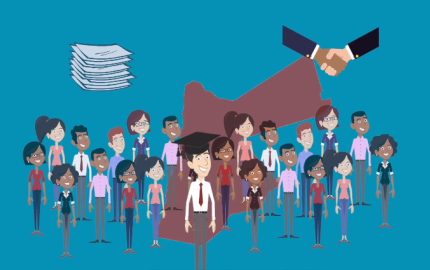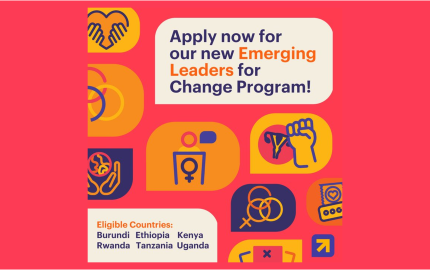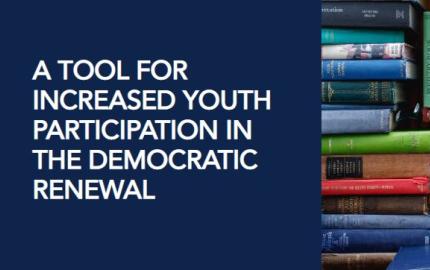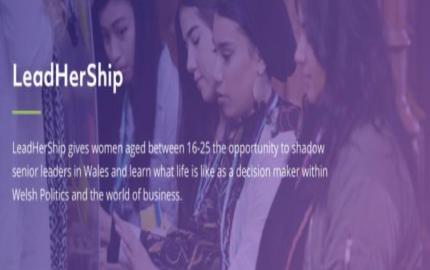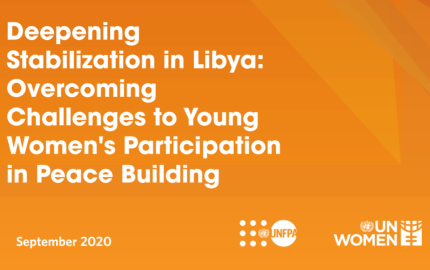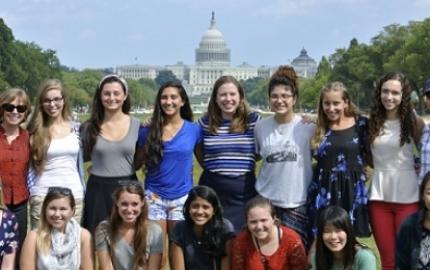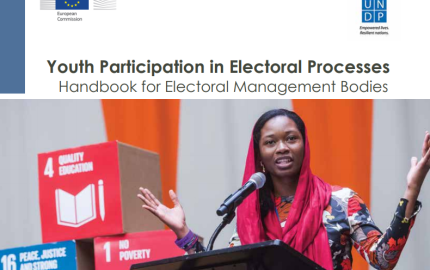Youth
Main navigation
The continued expansion of internet use in Kyrgyzstan has created new opportunities for young people to meaningfully participate in politics. Looking to take advantage of this new avenue for political participation, NDI partnered with Radio Azattyk (the Kyrgyzstani affiliate of Radio Free Europe/Radio Liberty) to produce a weekly livestreamed political discussion show, “Azattyk Club.” The platform is currently the only livestreamed political show in Kyrgyzstan. Since the show’s debut in April 2017, more than 100,000 people (an average of 10,000 viewers per episode) have watched across Facebook, YouTube and the Azattyk website.
Whereas more standard television programming in Kyrgyzstan consists of pre-recorded or strictly managed interview segments, often edited to remove controversial topics, Azattyk Club emphasizes live, unedited interactions between citizens and their elected representatives. This requires politicians to present stronger arguments in favor of their positions, while giving their constituents a rare platform to hold their elected officials accountable.
Each episode features one major political figure, such as a parliamentary faction leader, a member of parliament (MP), or a prominent government official. Two moderators ask these politicians a series of questions about their work and views of the current political environment.
Click here to learn more.
NDI’s youth program aims to promote engagement among youth in the electoral and political processes through civic education, active learning and targeted participation. NDI’s program is two-tiered: students begin with the Ana Usharek (“I Participate”) program and learn about the basics of the political system, then graduate to the Usharek+ program, where they channel that knowledge into active participation and advocacy. Ana Usharek engages university students in the political process throughdiscussions and interactive learning on democracy, human rights, electoral systems, political parties, and the role of the media, citizenship and local governance. Beginning at eight universities in 2011, the Ana Usharek program and is now implemented in 28 universities, public and private, in every governorate in Jordan. More than 30,000 students have graduated from the program.
Hear from the scholars of International IDEA’s Youth Democracy Academy (YDA) pilot programme. YDA is designed to ensure that young women and men, too often marginalized from political processes, are equipped with the knowledge and skills needed to effectively participate in, and contribute to, the consolidation and strengthening of their democracies.
International IDEA’s Youth Democracy Academy is designed to ensure that young women and men, too often marginalized from political processes, are equipped with the knowledge and skills needed to effectively participate in, and contribute to, the consolidation and strengthening of their democracies.
The Youth Democracy Academy consists of 12 modules that are delivered in a series of workshops. Each module is broken down according to five substantive sections.
Click here to learn more.
Hanna Hopko is a Ukrainian Member of Parliament and the head of the Parliamentary Foreign Affairs Committee.
The Women Deliver Emerging Leaders for Change Program is a two-year leadership program that supports passionate young activists with the resources, platforms, connections, and trainings necessary to amplify and achieve their advocacy goals. Women Deliver, with its strong commitment to both gender equality and sexual and reproductive health and rights (SRHR), has a strong history of equitable youth engagement and co-leadership.
The Emerging Leaders Program is a focused, well-resourced, thematically-bound program that will co-create each Emerging Leader’s advocacy journey with them. It is the result of us:
- Taking stock of a decade’s worth of lessons learned
- Reflecting on our own transformation as an organization
- Conducting numerous consultations with youth and partners in the field
Women Deliver will work with each Emerging Leader on developing their journey with flexible funding, support, trainings, and resources.
Who Is Eligible for the Program?
1. Young people (aged 15-29) of any gender and sexual identity who:
2. Live and work in Burundi 🇧🇮, Ethiopia 🇪🇹, Kenya 🇰🇪, Rwanda 🇷🇼, Tanzania 🇹🇿, or Uganda 🇺🇬
3. Advocate for sexual and reproductive health and rights (SRHR) and/or gender equality, particularly focusing on advocacy that affects adolescent girls within their communities. Preference will be given for those interested or experienced in our focus issue areas: universal health coverage, the climate crisis, and countering the anti-rights movement.
Apply here before the 30 May 2024, at 11:59 pm (23:59) EAT.
Image by Women Deliver
.
With half of the world’s population under 30, the continued survival of democracy globally is overwhelmingly dependent on youth support.
Today, democracy faces a public confidence problem that disproportionally affects youth. After decades of not seeing democracy work for them and politics appearing out of their reach, many young people simply disengage from political and civic life. Democracies around the world increasingly recognize that in order to rejuvenate pluralistic democracy, young people need to be given the means to participate in all aspects of democratic politics.
In this context, the Youth Political and Civic Engagement Cohort – part of the Summit for Democracy’s Year of Action – was launched to take action toward implementing the Summit’s commitments vis-à-vis youth political and civic engagement. As a multi-stakeholder platform with over 50 member organizations from governments, IGOs, and civil society, the Youth Participation Cohort is committed to actively contributing to the Year of Action by broadening the evidence base on youth participation.
As part of the Youth Cohort’s leadership group, the European Democracy Youth Network (EDYN) and the European Partnership for Democracy (EPD) have spearheaded the creation of the Cohort’s Youth Participation Handbook.
Click here to see it.
Despite progress, women continue to be under-represented in positions of power and leadership in Government, Business, and public life. This picture is even worse for BAME women, LGBTQ+ women, disabled women, and women who experience additional inequality. We will only be able to truly address all of the issues we face as a society when we have diverse representatives that reflect the communities we live in.
LeadHerShip aims to ensure that women become better represented in such decision-making roles and provide women with a platform so that their voices are heard, and they are inspired to see themselves as future leaders.
There are three LeadHerShip programmes. Chwarae Teg will provide young women with shadowing opportunities in national politics at the Assembly, local politics at various local councils, and in business following female leaders at a variety of Welsh businesses.
Click here to learn more.
As Libya struggles with continued political conflict and economic turmoil amid the COVID-19 pandemic, young women who want to contribute to peacebuilding, political processes, and economic reconstruction face serious obstacles. Their marginalization inhibits prospects for a sustainable peace and reconstruction, as political settlements that fail to include all age and gender demographics tend to perform worse over the medium and long run.
This policy brief summarizes some of the challenges young Libyan women face and offers recommendations for international, national, and local stakeholders. The challenges and recommendations outlined here are drawn directly from a series of conferences held with and by young Libyan women, and were developed through further research and consultation.
Click here to access the paper.
Running Start’s flagship program introduces high school girls to the power of political leadership. It includes workshops led by experts about public speaking, networking, fundraising, on-camera media training, and advocacy. Women candidates and elected officials speak about what it is like to run as a young woman, how to get involved on a local level, and why it is important to get more women elected. The goal of the program is to encourage the girls to channel their leadership skills into politics.
This program has been held in Washington, DC, since 2007. Over the years, more than 40,000 young women have applied. Other YWPL trainings have been held in California, New York, Michigan, and Sierra Leone.
Click here to learn more and apply.
Specifically designed for electoral management bodies (EMBs), this publication acknowledges the crucial role EMBs play in ensuring that all segments of the society, including youth, are empowered to fully participate in the electoral process, be as voters, candidates or officials.
The handbook provides strategies and entry points to assist EMBs in removing existing barriers for youth electoral participation at different levels and in different areas, including the national legal and political framework and youth’ lack of confidence in national institutions. The publication also explores how EMBs could capitalize on innovative solutions to make electoral processes more inclusive and peaceful and to prevent youth from being incited to electoral violence by political parties. Finally, the handbook links these objectives to the outcomes and indicators of SDGs, in particular Goal 16.
The handbook is published by the Brussels-based EC-UNDP Joint Task Force on Electoral Assistance (JTF) and made possible thanks to the support of the UNDP Nepal Electoral Support Project, generously funded by the EU, Norway, the United Kingdom and Denmark.
Click here to access the publication.

